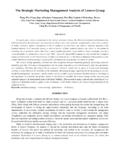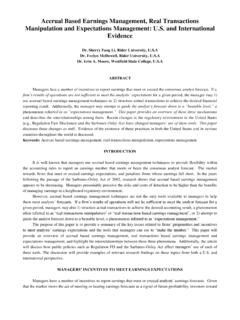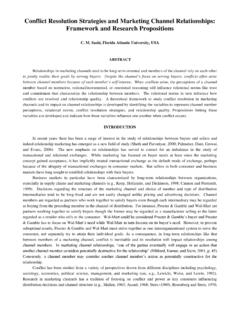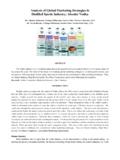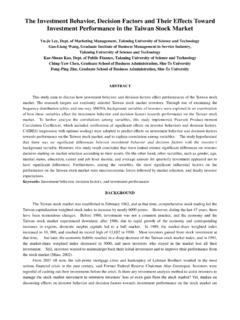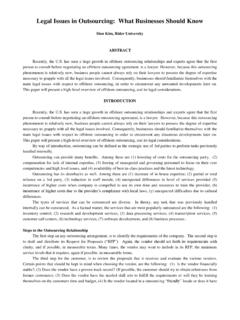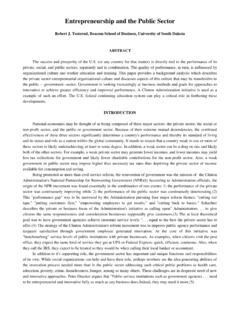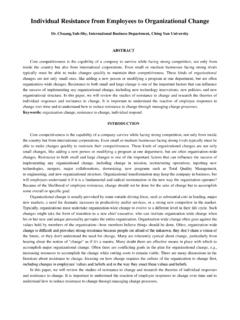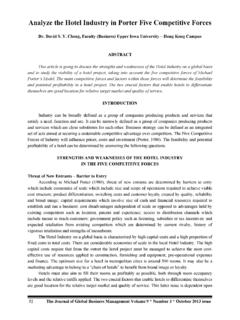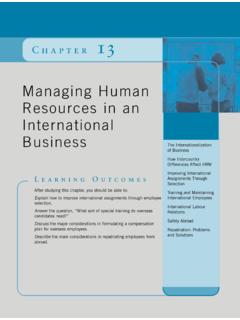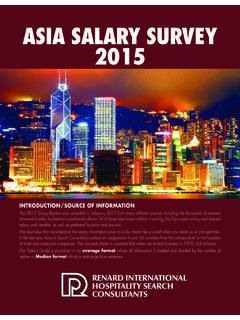Transcription of Modelling the Effect of Overseas Adaptation and …
1 Modelling the Effect of Overseas Adaptation and Competence of expatriate Managers on Job Performance in China Mei-Yane Chung, Department of Business Administration, Feng Chia University, Taiwan Wei-Yu Chen, Program in Business, Feng Chia University, Taiwan ABSTRACT. Along with the trend of globalization, more and more companies are adopting international operations and actively establishing Overseas subsidiaries. However, the selection of the right and effective expatriates to successfully carry out the company's international operations mission is an important task for these multinational companies. Using expatriate managers in China as the survey respondents, this study analyzed the influence of expatriate managers'.
2 Overseas Adaptation and personal competence upon performance. The result of this study is expected to offer some suggestions for expatriate managers assigned to China in order to avoid the Effect of mal- Adaptation and a worse performance, which could cause increased costs for a company's international operations. Keywords: Overseas Adaptation ; Personal competence; Job performance INTRODUCTION. In today's business environment, the ability to improve business performance is a critical requirement for any organization (Han et al., 2010). Thus, fast developments resulting from internationalization has made popular the trend of an enterprise's investment decision in foreign countries.
3 Consequently, international human resources play an even more important role in global competition. Ren, Chandrasekar and Li (2012) reported that the purpose of R&D. investment is to improve the performance. However, current researchers have argued that human resources and human capital may be seen as a source of sustained competitive advantage for organizations (Barney, 1991,1995; Becker and Gerhart, 1996; Janey et al., 2008) . Therefore, many transnational corporations use expatriates as a tool to expand their Overseas businesses. About 90% of all expatriates accepting an international assignment are willing to have a partnership with the company (Ali, Van der Zee and Sanders,2003; Van der Zee, Ali, and Haaksma, 2007).
4 However, according to the research by Black and Mendenhall (1990), 16% to 40% of expatriate managers terminate their Overseas missions ahead of time due to poor performance or mal- Adaptation . Furthermore, 50% of them are unable to work in their original positions because of poor performance (Black and Mendenhall, 1990). In addition, based on more than eighty transnational corporations, the research scholar Tung pointed out that, in more than 40 companies, 10% to 20% of expatriate managers were repatriated to the headquarters or dismissed due to their inability to effectively carry out assigned missions (Tung, 1982). Numerous studies have attempted to pinpoint the exact reasons for failure in order to develop solutions that counteract these problems, boosting success rates and developing strategies to avoid failure (Hall and Yeaton, 2008).
5 Thus, the problem of how to select capable expatriate managers has become an issue that businesses should pay attention to. Indeed, recent empirical research has indicated that problems with adjustment in the host country, especially in the host workplace, are related to reduced work effort and performance (Harrison and Shaffer, 2005). Thus, does the level of Overseas Adaptation affect the job performance of an expatriate manager? Does the level of professional competence affect the job performance of an expatriate manager? The Journal of Global Business Management Volume 8 * Number 2 * August 2012 49. LITERATURE REVIEW. Adaptation Overseas Bandura (1977) presented the social learning theory and posited that most human behavior is learned observationally through Modelling .
6 By observing others, one forms an idea of how new behavior is performed, and on later occasions, this coded information serves as a guide for action (Bandura,1977). According to the uncertainty theory of cross-cultural Adaptation by Gudykunst and Hammer (1988), cultural similarities in the learning of social and cultural aspects is primarily carried out through psychological cognitive adjustment in order to reach the goal of Adaptation . In the research to study expatriate manager's Adaptation , Gu (1993) used the following three dimensions: (1). Living Adaptation : weather, health, leisure life, etc. (2) Work Adaptation : work missions, social activities, etc.
7 And (3). Cultural Adaptation : customs, values, etc. Additionally, studies by Black and Mendenhall (1990) and Black, Gregersen, Mendenhall and Stroh (1998) also indicated that expatriate personnel's Adaptation to an Overseas environment can be analyzed from three dimensions: (1). Working Adaptation : the Adaptation to work missions. (2) Interaction Adaptation : the Adaptation to local society and language in the host country. (3) General living Adaptation : such as shopping, inhabitation, diet, etc . Based on the expatriate Adaptation model by Chen (2010), the following three dimensions were used: (1) Work Adaptation : Work Adaptation consists of the comfort associated with the assigned job or tasks.
8 (2) General Adaptation : General Adaptation means the comfort associated with non-work factors, such as local food, transportation, living conditions and environment, entertainment, and facilities in the host country. (3) Interaction Adaptation : Interaction Adaptation consists of the comfort associated with interacting with the host country nationals at work. Personal Competence In the global business environment, success is highly dependent on the quality of international management (Mitrev and Culpepper, 2012) and personal competence. According to Stout and Smith (1986), competence is a behavior that presents an individual's knowledge and skill, and can be comprehended as a person's quality or a kind of status, having enough skills.
9 In a research on 250 stationed Japanese managers, Black and Stephens (1989) pointed out the dimensions in relation to expatriate personnel's competence: (1) Cultural flexibility: is the capability to substitute activities enjoyed in the home culture with those existing, and usually distinctive, in the host country. (2) Social orientation: is the ability to develop good communications with local people in the host country. (3) Willingness to communicate: is the ability to develop good communications with local people in the stationed area. (4) Conflict resolution: expatriate personnel's ability to solve interpersonal conflicts. Hiltrop and Janssens (1995) also organized several scholarly researches and presented four dimensions in the area of expatriate personnel's personal competence: (1) Technical competence (2) Stress tolerance competence (3) Communication competence (4) Cultural empathy competence Drawing on Aycan (1997), personal competences include managerial resourcefulness, technical and managerial competence, and relational skills.
10 Managerial resourcefulness includes reducing withdrawal and excessive excitement, controlling aggressive and regressive tendencies, enthusiasm, interest and commitment to meeting challenges in life. Managerial resourcefulness focuses goal analyses through analytical thinking, diagnostic information generation to assess the situation, planning for alternative courses of action and self-reflection for strengthening self-efficacy belief (Aycan, 1997). Technical and managerial expertise help to reduce the uncertainties associated with the new job role and helps to reduce stress and facilitate adjustment (Aycan, 1997). 50 The Journal of Global Business Management Volume 8 * Number 2 * August 2012.
